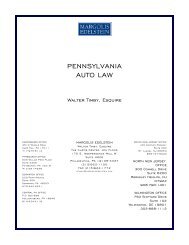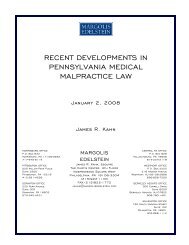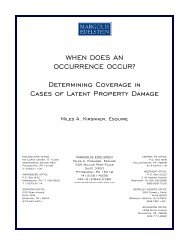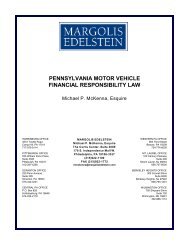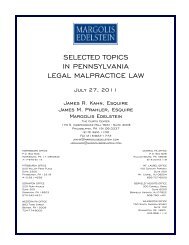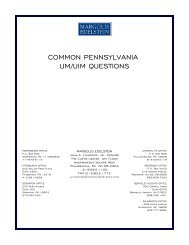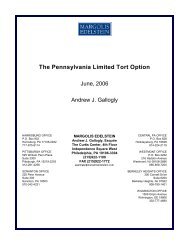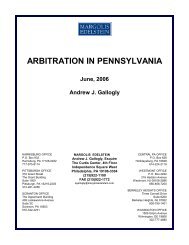Commercial General Liability Coverage Exclusions Under
Commercial General Liability Coverage Exclusions Under
Commercial General Liability Coverage Exclusions Under
You also want an ePaper? Increase the reach of your titles
YUMPU automatically turns print PDFs into web optimized ePapers that Google loves.
way respond to, or assess the effects of, “pollutants”; or<br />
(b) Claim or “suit” by or on behalf of a governmental authority for damages because of<br />
testing for, monitoring, cleaning up, removing, containing, treating, detoxifying or<br />
neutralizing, or in any way responding to, or assessing the effects of, “pollutants”.<br />
However, this paragraph does not apply to liability for damages because of “property<br />
damage” that the insured would have in the absence of such request, demand, order or<br />
statutory or regulatory requirement, or such claim or “suit” by or on behalf of a<br />
governmental authority.<br />
• This version of the pollution exclusion, generally referred to as the “absolute” pollution<br />
exclusion (even though it is not) was reportedly written in response to adverse judicial interpretations<br />
of the original 1973 ISO version, which excluded coverage for injury or damage resulting from<br />
pollution or contamination more generally, but contained a troublesome exception to that exclusion<br />
for pollution incidents which were “sudden and accidental,” resulting in insurers affording coverage<br />
on a broader basis than anticipated in some jurisdictions.<br />
• This common version is both much lengthier and less comprehensive than the newer and socalled<br />
“total” pollution exclusion, which is sometimes substituted by endorsement. For purposes<br />
of comparison, one variation upon the “total” exclusion provides that the policy does not apply to:<br />
f. Pollution<br />
(1) “Bodily injury” or “property damage” which would not have occurred in whole or<br />
in part but for the actual, alleged or threatened discharge, dispersal, seepage, migration,<br />
release or escape of “pollutants” at any time.<br />
(2) Any loss, cost or expense arising out of any:<br />
(a) Request, demand, order or statutory or regulatory requirement that any insured or<br />
others test for, monitor, clean up, remove, contain, treat, detoxify or neutralize, or in<br />
any way respond to, or assess the effects of “pollutants”; or<br />
(b) Claim or suit by or on behalf of a governmental authority for damages because<br />
of testing for, monitoring, cleaning up, removing, containing, treating, detoxifying<br />
or neutralizing, or in any way responding to, or assessing the effects of, “pollutants”.<br />
Sometimes the less said, the better.<br />
• For purposes of interpreting this exclusion, the term “pollutants” is defined to mean, “any<br />
solid, liquid, gaseous or thermal irritant or contaminant, including smoke, vapor, soot, fumes,<br />
acids, alkalis, chemicals and waste. Waste includes materials to be recycled, reconditioned or<br />
reclaimed.”<br />
10



